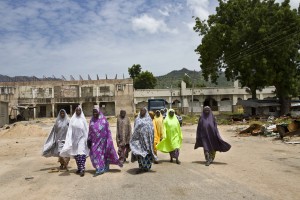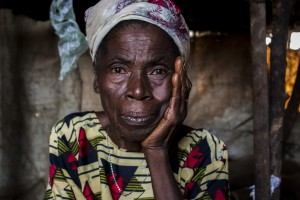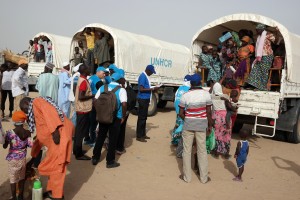Barbara Hendricks: “Stateless people are like ghosts, forced to lead their lives in the shadows”
The UNHCR Goodwill Ambassador met with some of those invisible people and is now an outspoken advocate for their cause.
ABIDJAN, CÔTE D’IVOIRE, 25 February (UNHCR) – Lifetime Goodwill Ambassador Barbara Hendricks went to Côte d’Ivoire some months ago to raise awareness on the issue of statelessness and is now par of the Conference on Stateless people being held in Abidjan. The internationally recognised opera and jazz singer has been committed to the cause of refugees since joining UNHCR nearly 30 years ago, and has travelled all over the world to lend her voice to their plight. According to the Government’s estimates, there are at least 700,000 persons considered stateless or at risk of statelessness in Côte d’Ivoire. Barbara Hendricks met some of them and has since become an outspoken advocate for their cause. She talked to UNHCR Information Officer Nora Sturm.
Since when have you been involved with UNHCR and were you familiar with the problem of statelessness before your trip to Côte d’Ivoire?
UNHCR contacted me in 1986 and asked me to be a part of the Goodwill Ambassador programme, which was just getting off the ground. I had for a long time been an activist for the promotion and defence of human rights and became especially drawn to the plight of refugees after learning about the work of UNHCR.
I knew about statelessness but had not studied it in depth. When I learned UNHCR High Commissioner António Guterres planned to launch a 10-year campaign to eradicate it, I immediately felt that this was a cause that I wanted to support. It is an issue that is often forgotten in the midst of more visible problems, and one that few people understand. The idea of not having a nationality is a difficult concept for most people to grasp.
Why does the fight against statelessness inspire you so much?
I can relate to the issue because I was born and raised in the U.S.A. in the 50s and 60s under the cruel and unjust Jim Crow segregation laws that separated the races in schools, hospitals, public transportation, even water fountains. I did not benefit from all the rights and responsibilities that white citizens had at that time. I was 16 years old when the Civil Rights Act of 1964 was passed, ending official discrimination based on race, colour, religion, gender or national origin and granting the right to vote to all U.S citizens. This law meant so much to me because it gave me not only my rights as a citizen but also the responsibilities of citizenship and thus the power to effect change. I can understand how important it is for the children that I met in Côte d’Ivoire to receive birth certificates and to begin the process of formally acquiring the Ivorian nationality.
 UNHCR / PAUL WU
UNHCR / PAUL WUBarbara Hendricks speaks with the children of SOS Village in Aboisso. Many of them have benefited from the assistance of UNHCR and its Government Partner, the Ministry of Justice, Human Rights and Public Liberties to obtain late birth certificates (or “jugements supplétifs”), which is an important component in the process of obtaining or confirming one’s nationality in Côte d’Ivoire.
Why is this cause so important?
Being a citizen of a country and belonging to a group of people working towards a common goal is precious. When people are left out of this communal identity, the consequences are negative for the individuals in question and for the country at large. Stateless persons are outside of the writ of law and do not receive the State’s protection. Stateless children cannot go to University or take national exams that entitle them to compete for civil servant jobs; stateless people cannot vote, own land, get legally married, open a bank account, get access to healthcare, or travel. The list goes on. They’re basically invisible in the eyes of the State and are forced to lead their lives in the shadows. But statelessness not only affects individuals, it is also detrimental to the well-being of society at large because it excludes large swathes of the population and prevents them from contributing to the productive capacity of their country. We are never stronger than our weakest link, and societies will inevitably be held back if the full potential of their population cannot move forward together and overcome significant developmental obstacles.
What were some of the memorable parts of your recent trip to Côte d’Ivoire?
Being crowned Queen of the Kingdom of Sanwi, of course! On a more serious note, my meeting with the students at SOS Village in Aboisso was very moving and informative. This school, in eastern Côte d’Ivoire, close to the border with Ghana, gives a home and an education to children whose parents cannot take care of them. More often than not, they arrive at the centre without any documents, cannot prove their origins and are at serious risk of statelessness. By facilitating the registration process for these children, the school enables them to integrate into Ivoirian society and have a future. A major handicap has been lifted from these children’s lives; they can now stand up on their own two feet and become full-fledged members of the State.
 UNHCR / NORA STURM
UNHCR / NORA STURMUNHCR Lifetime Goodwill Ambassador Barbara Hendricks is welcomed by the King of Aboisso, in the south-eastern Kingdom of Swani. This area, located 50km from the border with Ghana, is home to a large population of migrants from Ghana who settled in Côte d’Ivoire over the years for bothfamily and professional reasons.
Did you meet anyone special during your mission in Côte d’Ivoire?
I met a girl who dreams of becoming an international human rights lawyer, another who wants to pursue a career in singing, and a young man who is interested in world history. On the second day I witnessed a ceremony for children receiving their birth certificate. I told a 9-year-old girl that she will finally be recognised as a citizen by the Ivoirian Government and that the sky is the limit! All these young people can contribute to making Côte d’Ivoire and the world a better place and citizenship gives them the rights and the power to do that. Many doors that were previously closed are now open to them. The Ivorian government has made important progress in addressing the problem of statelessness – in particular by ratifying the 1954 and 1961 international Conventions relating to statelessness – but more work remains to be done. On my last day in Abidjan, I met several women who have been waiting for years to obtain identification documents. In the interim, they are essentially non-people, without any rights, privileges or power.
How can you contribute in your capacity to the UNHCR’s campaign to eradicate statelessness within the next 10 years?
My role as Goodwill Ambassador is to raise awareness and shed light on this complex issue. Being stateless is something that few people know about, let alone understand. My goals are to increase the visibility of stateless persons, help the general population understand the consequences that being stateless has on people’s daily lives and future prospects, and ultimately mobilise public opinion to affect political change. Political leaders all over the world need to realise that their citizens think that it is unacceptable for people living on their soil to be stateless and not to be afforded equal protection by the State. Political will is essential to change the laws currently in place in many countries that marginalise people and do not bestow equal rights upon all.
 UNHCR / PAUL WU
UNHCR / PAUL WUBarbara Hendricks in Dronguine, western Côte d’Ivoire. She stands next to the mayor of the town and the children who were recently repatriated from Liberia and who, with the help of UNHCR, acquired birth certificates for the first time in their lives.
To learn more:
http://www.unhcr.org/pages/49db772b8c.html
Barbara Hendricks : "Les apatrides sont comme des fantômes, forcés de mener leur vie dans l’ombre"
L’Ambassadrice de bonne volonté du HCR a rencontré quelques unes de ces personnes invisibles et est désormais une fervente défenseuse de leur cause
ABIDJAN, CÔTE D’IVOIRE, 25 février (UNHCR) - L’Ambassadrice de bonne volonté à vie du HCR, Barbara Hendricks, s’est rendue en Côte d’Ivoire il y a quelques mois pour sensibiliser le public au problème de l’apatridie et participe a la conférence sur l‘apatridie qui se tient en ce moment à Abidjan. La chanteuse d’opéra et de jazz de renommée mondiale s’est engagée pour la cause des réfugiés lorsqu’elle a rejoint le HCR il y a près de 30 ans, et a voyagé à travers le monde entier pour prêter sa voix à leur détresse. Selon les estimations du gouvernement, il y a au moins 700 000 personnes considérées comme apatrides ou à risque d’apatridie en Côte d’Ivoire. Barbara Hendricks a rencontré certains d’entre eux et est depuis devenue une active défenseuse de leur cause. Elle a accepté de répondre aux questions de la responsable de l’information pour le HCR en Côte d’Ivoire, Nora Sturm.
Depuis quand êtes-vous impliquée dans les activités du HCR et étiez-vous familiarisée avec le problème de l’apatridie avant votre voyage en Côte d’Ivoire?
Le HCR m’a contactée en 1986 et m’a demandé de faire partie du programme des Ambassadeurs de bonne volonté, qui venait d’être lancé. J’étais depuis longtemps impliquée dans des activités pour la promotion et la défense des droits humains et j’ai été particulièrement touchée par la cause des réfugiés après avoir découvert le travail du HCR. Je connaissais le problème de l’apatridie mais ne l’avais pas étudié en profondeur. Quand j’ai appris que le Haut Commissaire du HCR, António Guterres, prévoyait de lancer une campagne pour éliminer l’apatridie en l’espace de 10 ans, j’ai immédiatement senti qu’il s’agissait d’une cause que je voulais soutenir. C’est un problème souvent oublié parmi d’autres problèmes plus visibles, et un sujet que peu de personnes connaissent. L’idée de ne pas avoir de nationalité est un concept difficile à saisir pour la plupart des gens.
Pourquoi la lutte contre l’apatridie vous inspire-t-elle tant?
Je peux m’identifier à ce problème parce que je suis née et ai été élevée aux Etats-Unis dans les années 1950 et 1960, sous les lois ségrégationnistes cruelles et injustes de Jim Crow, qui séparaient les races dans les écoles, dans les hôpitaux, dans les transports publics et même aux fontaines à eau. Je n’ai pas bénéficié de tous les droits et devoirs que les citoyens blancs avaient à cette époque. J’avais 16 ans lorsque le Civil Rights Act de 1964 a été voté, mettant un terme à la discrimination officielle fondée sur la race, la couleur, la religion, le sexe et l’origine nationale, et donnant le droit de vote à tous les citoyens américains. Cette loi signifiait tellement pour moi, parce qu’elle me donnait non seulement mes droits en tant que citoyenne mais aussi les responsabilités qu’entraîne la citoyenneté, et par conséquent le pouvoir de changer les choses. Je peux comprendre combien il est important pour les enfants que j’ai rencontrés en Côte d’Ivoire de recevoir des certificats de naissance et de commencer le processus d’acquisition formelle de la nationalité ivoirienne.
Pourquoi cette cause est-elle si importante?
Etre citoyen d’un pays et appartenir à un groupe de personnes travaillant vers un but commun est quelque chose de précieux. Quand les gens sont mis à l’écart de cette identité commune, les conséquences sont négatives pour les individus en question et pour le pays dans son ensemble. Les apatrides sont hors du champ d’action de la loi et ne reçoivent pas la protection de l’Etat. Les enfants apatrides ne peuvent pas aller à l’université ou passer des examens nationaux qui leur permettent de concourir pour des postes de fonctionnaires ; les apatrides ne peuvent pas voter, posséder de terres, se marier légalement, ouvrir de compte en banque, avoir accès aux services de santé ou voyager. La liste continue. Ils sont en réalité invisibles aux yeux de l’Etat et forcés de mener leur vie dans l’ombre. Mais l’apatridie n’affecte pas seulement les individus, elle nuit aussi au bien-être de la société dans son ensemble car elle exclut de larges groupes de la population et les empêche de contribuer à la capacité productive du pays. Nous ne sommes jamais plus forts que notre maillon le plus faible, et les sociétés seront inévitablement tirées vers le bas si le plein potentiel de leur population ne peut pas être atteint collectivement et dépasser d’importants obstacles au développement.
Quels ont été les moments les plus mémorables de votre récent voyage en Côte d’Ivoire ?
Mon couronnement comme reine du Royaume de Sanwi bien extendu! Plus sérieusement, une rencontre avec les étudiants à SOS Village à Aboisso était très émouvante et m’a beaucoup appris. Cette école, à l’est de la Côte d’Ivoire, près de la frontière avec le Ghana, offre un foyer et une éducation aux enfants dont les parents ne peuvent pas s’occuper. La plupart du temps, ils arrivent au centre sans aucun papier, ne peuvent pas prouver leurs origines et courent un grand risque de devenir apatrides. En facilitant le processus d’enregistrement pour ces enfants, l’école leur permet d’intégrer la société ivoirienne et d’avoir un avenir. Un handicap majeur a été éliminé de la vie de ces enfants ; ils peuvent désormais se dresser sur leurs deux pieds et devenir des membres de l’Etat à part entière.
Avez-vous rencontré quelqu’un de spécial pendant votre mission en Côte d’Ivoire ?
J’ai rencontré une jeune fille qui rêve de devenir avocate internationale pour les droits humains, une autre qui veut se lancer dans une carrière de chanteuse et un jeune homme qui est intéressé par l’histoire mondiale. Le deuxième jour j’ai assisté à une cérémonie pour les enfants recevant leur certificat de naissance. J’ai dit à une fille de 9 ans qu’elle allait enfin être reconnue comme citoyenne par le gouvernement ivoirien et que le ciel était sa seule limite ! Tous ces jeunes gens peuvent contribuer à faire de la Côte d’Ivoire et du monde un endroit meilleur et la citoyenneté leur donne les droits et les pouvoirs pour faire cela. De nombreuses portes qui leur étaient auparavant fermées leur sont désormais ouvertes. Le gouvernement ivoirien a fait d’importants progrès dans la gestion du problème de l’apatridie – notamment en ratifiant les conventions internationales de 1954 et 1961 relatives à l’apatridie – mais il y a encore du travail à faire. Lors de mon dernier jour à Abidjan, j’ai rencontré plusieurs femmes qui attendent depuis des années d’obtenir leurs papiers d’identité. En attendant, elles sont en réalité des non-personnes, sans aucun droit, privilège ou pouvoir.
Comment pouvez-vous contribuer à votre niveau à la campagne du HCR pour éliminer l’apatridie en l’espace de 10 ans?
Mon rôle en tant qu’Ambassadrice de bonne volonté est de sensibiliser les gens et de mettre ce problème complexe sur le devant de la scène. Etre apatride est quelque chose que peu de personnes connaissent, et encore moins comprennent. Mes objectifs sont d’accroître la visibilité des personnes apatrides, d’aider la population en général à comprendre les conséquences de l’apatridie sur la vie quotidienne des personnes et sur leurs possibilités d’avenir, et enfin de mobiliser l’opinion publique pour initier le changement politique. Les dirigeants politiques à travers le monde doivent réaliser que leurs citoyens trouvent inacceptable que les personnes vivant sur leur territoire soient apatrides et ne reçoivent pas une protection équitable de la part de l’Etat. La volonté politique est essentielle pour changer les lois actuellement en place dans de nombreux pays qui marginalisent les gens et n’octroient pas des droits égaux à tous.
Pour en savoir plus :



















